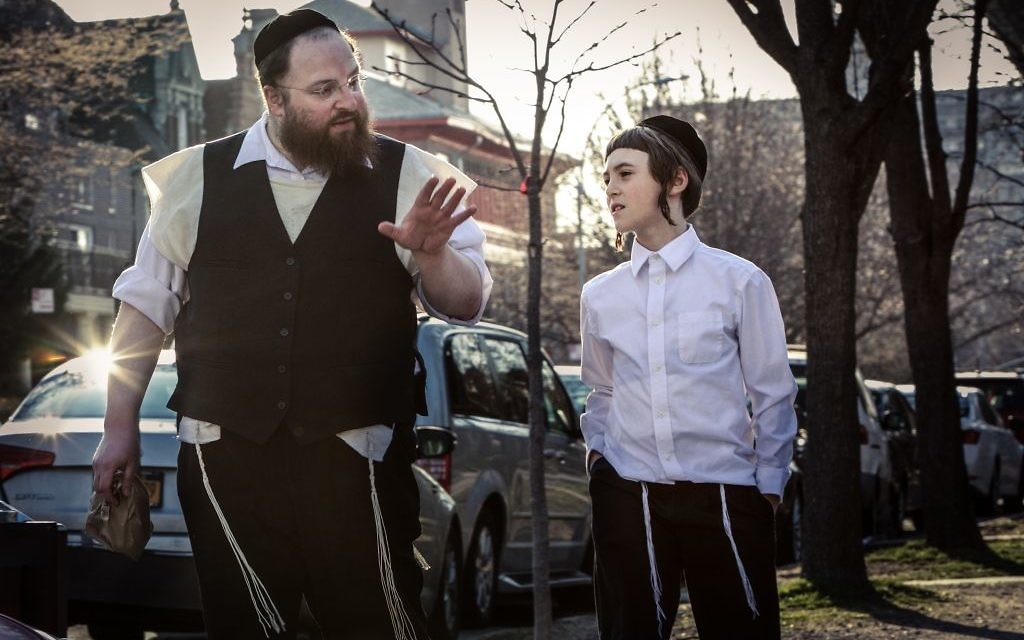Rare Yiddish Film Illuminates Hasidim
Yiddish crafts a space where the values, mores and laws of the society are experienced instead of criticized.
At least four Yiddish films have been made for the big screen since 2010 as part of a trend taking advantage of low-cost modern camera equipment to depict underrepresented cultures and languages.
The latest is “Mensashe,” an independent production filmed entirely in Yiddish. It was the Atlanta Jewish Film Festival’s AJFF Selects movie in July and recently was picked up by A24 Films, the distributor behind Oscar winners “Moonlight,” “Ex Machina” and “Room.” The film is tentatively scheduled to open in Atlanta on Friday, Aug. 18.
The movie follows Menashe, a recently widowed Orthodox Jewish man living in the Borough Park neighborhood of Brooklyn. Having married at a young age, Menashe has difficulty finding stability for his young son, who is taken away to be raised by his wealthy brother-in-law.
Get The AJT Newsletter by email and never miss our top stories Free Sign Up
He is left with the decision to find a new wife, a choice that to Menashe seems like an ultimatum.
What stands out about the film is the performance of the amateur cast, which includes a chief rabbi played by a taxi driver, said Eddy Von Mueller, an Emory University lecturer in film and media studies who spoke at the AJFF Selects screening July 30.
It’s “challenging to shoot a film with nontraditional actors,” Von Mueller said. “And part of a tradition of New York cinema is outsider cinema.”
The film was shot in Borough Park without permits. There is almost an ethnographic quality to the film, with streets filled with Orthodox Jews and scenes of drinking and in-depth discussions of halacha. The film provides a glimpse into traditions and a belief system that have survived for generations on the edges of a rejected mainstream society.
“Gentiles have broken families, and therefore they have a broken society,” one character says.
Director Joshua Weinstein and the cast did not speak Yiddish. They learned the lines phonetically. It’s an impressive feat that brought back memories for those who grew up hearing Yiddish at home, AIB-TV producer Audrey Galex said.
“It’s an intimate look at a community that was so much a part of my childhood,” said Galex, a native New Yorker. “On the one hand, you want people to recognize the authenticity of the experience.”
Von Mueller said the film’s unique perspective on the Orthodox community results in part from the emphasis on Yiddish, which becomes a main character. By using the language and subtitles, the story provides a peek inside a world that is cut off from those who are not immersed in Orthodox culture.
Yiddish crafts a space where the values, mores and laws of the society are experienced instead of criticized.
“It would be so easy to stand outside of the Orthodox community in a condescending light,” Von Mueller said.
The distinct clothing of Hasidic men can leave the impression that they are all the same, but “Menashe” challenges that perception through events that pit the main character against a variety of men in his community.
“It gives you an eye into the men’s world in the ultra-Orthodox community,” Von Mueller said. “There’s a range.”
The film focuses mainly on male relationships, leaving women on the sidelines. Men make all the decisions regarding family, finances and halacha. Women are rarely seen, leaving the audience to question whether that approach reflects respect for Orthodox observance or simply provides an accurate portrayal of the community.
There is a glimpse into the world of women when Menashe visits a neighbor’s apartment to retrieve a kugel recipe, and her daughter is sitting at a table, pregnant and silent. Another moment comes when a neighbor’s young daughter challenges her mother on why the rabbi gets to decide whether she goes to college.
Those short scenes are played out like women’s roles in the community — quietly and behind closed doors.
But for the most part, the film centers on men in the community and how the laws that govern the Hasidic sect are administered through a hierarchy of men who judge one another based on their levels of menschlichkeit.
“It’s an issue of an immigrant experience or Orthodox experience or any community that makes itself separate,” Von Mueller said.





comments